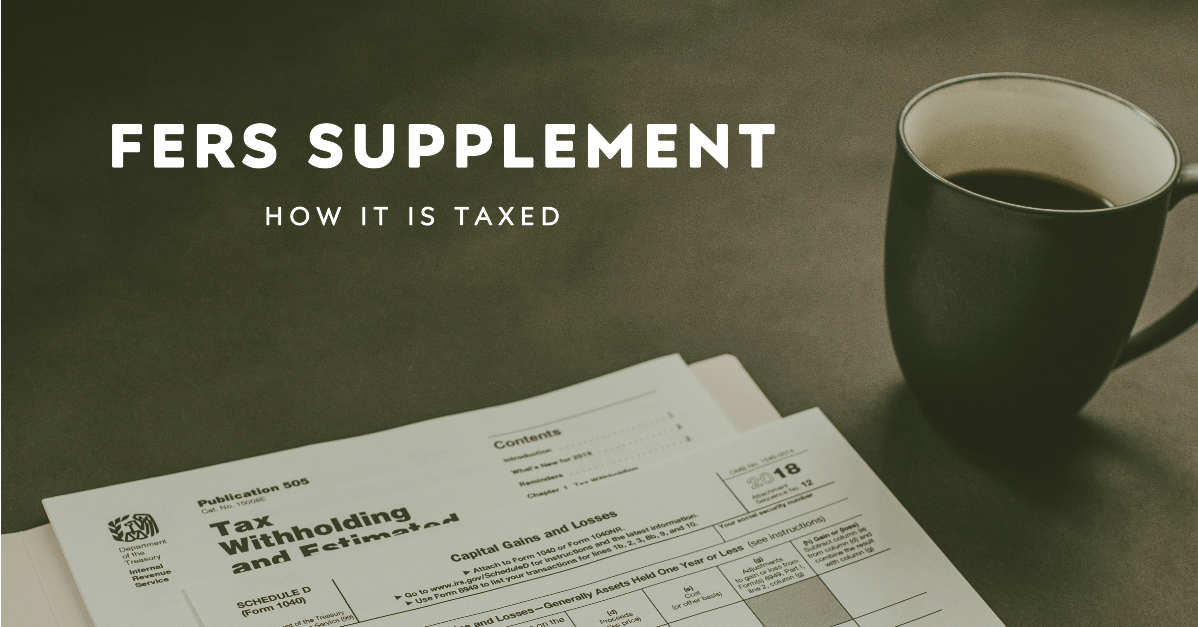How the FERS supplement is taxed during your federal retirement. Learn key details about this important benefit, the special retirement supplement.
Federal Retirement: How the FERS Supplement is Taxed
The Federal Employees Retirement System (FERS) is a comprehensive retirement plan designed for federal employees, providing them with income until they reach the age of 62, when they can begin drawing Social Security benefits. The benefit is not available at or after age 62 even if the federal retiree receiving the benefit chooses not to claim social security retirement benefits at that age. (Check out this article to learn what age might be best to start Social Security. ) Understanding how the FERS Supplement is taxed is crucial for federal retirees, as it can significantly impact their overall retirement plan. This article reviews the intricacies of FERS supplement taxation, its similarities with Social Security, and the various factors that influence tax implications for federal retirees.
Here’s a more comprehensive article that provides a general overview of the FERS Special Retirement Supplement
Use our FERS Supplement Calculator to determine a rough estimate of your supplement benefit amount
And if you want to start preparing for your FERS retirement now, check out our free FERS retirement webinars.
Knowledge is Confidence!
How is the FERS Supplement Taxed for Federal Employees?
What are the tax implications of the FERS Supplement?
The FERS Supplement, also known as the Special Retirement Supplement (SRS), is designed to provide additional income to federal retirees who are not yet eligible for Social Security benefits. When it comes to taxation, the FERS Supplement is subject to federal income tax. This means that retirees must report the supplement as part of their taxable income when filing their federal tax returns. The amount of tax owed will depend on the retiree’s total income, including any other retirement benefits, annuities, or earnings. It is essential for retirees to understand that while the FERS Supplement provides vital financial support, it also contributes to their overall tax liability, which can affect their retirement planning.
Are FERS Supplements subject to federal income tax?
Yes, FERS Supplements are indeed subject to federal income tax. Retirees who receive this supplement must include it in their gross income when calculating their federal tax obligations. The Internal Revenue Service (IRS) treats the FERS Supplement similarly to other forms of income, meaning that it is taxed at the retiree’s applicable income tax rate. This taxation can vary based on the retiree’s total income, deductions, and filing status. Therefore, it is advisable for retirees to consult with a tax professional to ensure they are accurately reporting their FERS Supplement and understanding the implications for their overall tax situation.
How does the taxation of the FERS Supplement differ from Social Security?
While both the FERS Supplement and Social Security benefits are subject to federal income tax, there are notable differences in how they are taxed. Social Security benefits may not be fully taxable, depending on the retiree’s combined income. If a retiree’s combined income exceeds certain thresholds, up to 85% of their Social Security benefits may be subject to federal income tax. In contrast, the FERS Supplement is fully taxable as ordinary income. This distinction is crucial for retirees to understand, as it can influence their overall tax burden and retirement income strategy. Additionally, the age at which a retiree begins to draw Social Security benefits can further complicate the tax implications of their retirement income.
What is the Relationship Between FERS Supplement and Social Security Benefits?
Can the FERS Supplement affect Social Security benefits?
The FERS Supplement doesn’t directly affect Social Security benefits. It was designed for feds who retire with an immediate FERS pensions before reaching eligibility for Social Security at age 62. However, if a retiree begins to draw Social Security benefits before reaching full retirement age, their Social Security benefits may be reduced based on their earnings. This reduction can impact the overall financial picture for retirees, as they must consider how the FERS Supplement and Social Security benefits interact and influence their total retirement income.
How does age 62 impact FERS Supplement and Social Security taxation?
Reaching age 62 is a significant milestone for federal retirees, as it marks the eligibility to begin drawing Social Security benefits. At this age, the FERS Supplement will be reduced or eliminated, depending on the retiree’s eligibility for Social Security. If a retiree decides to start receiving Social Security benefits at age 62, they must be aware that their FERS Supplement will be adjusted accordingly. This adjustment can have tax implications, as the retiree’s total income may change, affecting their federal income tax liability. Understanding the timing of these benefits and their tax consequences is essential for effective retirement planning.
What should retirees know about Social Security Administration rules?
Retirees should familiarize themselves with the rules set forth by the Social Security Administration (SSA) regarding the interaction between the FERS Supplement and Social Security benefits. The SSA has specific guidelines that dictate how benefits are calculated and how income affects eligibility. For instance, if a retiree continues to work while receiving Social Security benefits before reaching full retirement age, their benefits may be subject to reduction based on their earnings. This is known as the earnings test and a similar rule is applicable to the FERS supplement. This is something to watch out for if you plan on working another job after leaving federal service.
How Does the FERS Annuity Affect Retirement Income Taxation?
What is the difference between FERS annuity and FERS Supplement?
The FERS annuity and the FERS Supplement serve different purposes within the current federal retirement system. The FERS annuity is a monthly payment based on the retiree’s years of service and high-3 average salary, providing a stable source of income throughout retirement. In contrast, the FERS Supplement is a temporary benefit designed to bridge the gap until the retiree becomes eligible for Social Security. While both benefits contribute to a retiree’s overall income, they are taxed differently, with the FERS annuity being subject to federal income tax as well. Understanding the distinctions between these two benefits is crucial for retirees as they navigate their tax obligations and retirement income planning. You can start preparing for your retirement from the US federal government by scheduling a free meeting that includes a personalized benefit report.
What are the federal tax withholding options for retirees?
Federal retirees have several options when it comes to tax withholding on their retirement benefits, including the FERS Supplement and annuity. Retirees can choose to have federal income tax withheld from their monthly payments, which can help manage their tax liability and avoid underpayment penalties. The Office of Personnel Management (OPM) provides retirees with the option to adjust their federal tax withholding based on their individual financial situation. It is advisable for retirees to review their withholding options annually, especially if there are changes in their income or tax situation, to ensure they are adequately prepared for tax season.
What Factors Influence the Taxation of Federal Retirement Benefits?
How does the minimum retirement age impact FERS Supplement taxation?
The minimum retirement age plays a significant role in determining when federal employees can access their FERS benefits, including the FERS Supplement. If a retiree chooses to retire before reaching the minimum retirement age, they may face reductions in their benefits, which can influence their overall tax situation. Understanding the implications of retiring early and how it affects the FERS Supplement is crucial for effective retirement planning. Retirees should consider their financial needs and tax obligations when deciding on their retirement timing.
What are the common tax strategies for federal retirees?
Federal retirees can employ various tax strategies to minimize their tax liability and maximize their retirement income. One common strategy is to manage the timing of withdrawals from retirement accounts, such as the Thrift Savings Plan (TSP), to reduce the impact on their taxable income. Additionally, retirees may consider tax-efficient investment strategies, such as utilizing tax-deferred accounts or tax-free municipal bonds. Consulting with a tax professional can help retirees develop a personalized tax strategy that aligns with their financial goals and retirement plans.
How do state taxes affect federal retirement benefits?
In addition to federal income tax, retirees must also consider state taxes when planning their retirement income. Some states impose income taxes on retirement benefits, while others offer exemptions or lower tax rates for retirees. Understanding the state tax implications of receiving the FERS Supplement, FERS annuity, and TSP withdrawals is essential for federal retirees. It is advisable for retirees to research their state’s tax laws and consult with a tax advisor to ensure they are fully informed about their tax obligations and can make informed decisions regarding their retirement income.
What Should Retirees Know About FERS Supplement and Tax Withholding?
How can retirees manage tax withholding on their FERS Supplement?
Managing tax withholding on the FERS Supplement is an essential aspect of retirement planning for federal retirees. Retirees can adjust their federal income tax withholding by submitting a new W-4P form to the OPM. This form allows retirees to specify the amount of tax they wish to have withheld from their monthly payments. It is crucial for retirees to regularly review their withholding amounts, especially if there are changes in their income or tax situation, to ensure they are not under-withholding or over-withholding taxes.
What are the consequences of under-withholding on FERS benefits?
Under-withholding on FERS benefits can lead to significant tax liabilities during tax season. If retirees do not withhold enough federal income tax from their FERS Supplement and other retirement benefits, they may face penalties for underpayment. Additionally, retirees may be required to pay a lump sum when filing their tax returns, which can create financial strain. To avoid these consequences, retirees should carefully monitor their tax withholding and make adjustments as necessary to ensure they are meeting their tax obligations.
How to adjust federal income tax withholding for FERS retirees?
Adjusting federal income tax withholding for FERS retirees is a straightforward process. Retirees can complete a new W-4P form and submit it to the OPM to change their withholding preferences. It is advisable for retirees to consult with a tax professional to determine the appropriate withholding amount based on their total income and tax situation. Regularly reviewing and adjusting tax withholding can help retirees manage their tax liabilities effectively and ensure they are adequately prepared for tax season.
Reach Out to Us!
If you have additional federal benefit questions, contact our team of CERTIFIED FINANCIAL PLANNER™ (CFP®), Chartered Federal Employee Benefits Consultants (ChFEBC℠), and Accredited Investment Fiduciaries (AIF®). At PlanWell, we are federal employee financial advisors with a focus on retirement planning. Learn more about our process designed for the career fed.
Preparing for federal retirement? Check out our scheduled federal retirement workshops. Sign up for our no-cost federal retirement webinars using our online workshop schedule. Make sure to plan ahead and reserve your seat for our FERS webinar, held every three weeks. Want to have PlanWell host a federal retirement seminar for your agency? Reach out, and we’ll collaborate with HR to arrange an on-site FERS seminar.
Want to fast-track your federal retirement plan? Skip the FERS webinar and start a one-on-one conversation with a ChFEBC today. You can schedule a one-on-one meeting through our contact page.










